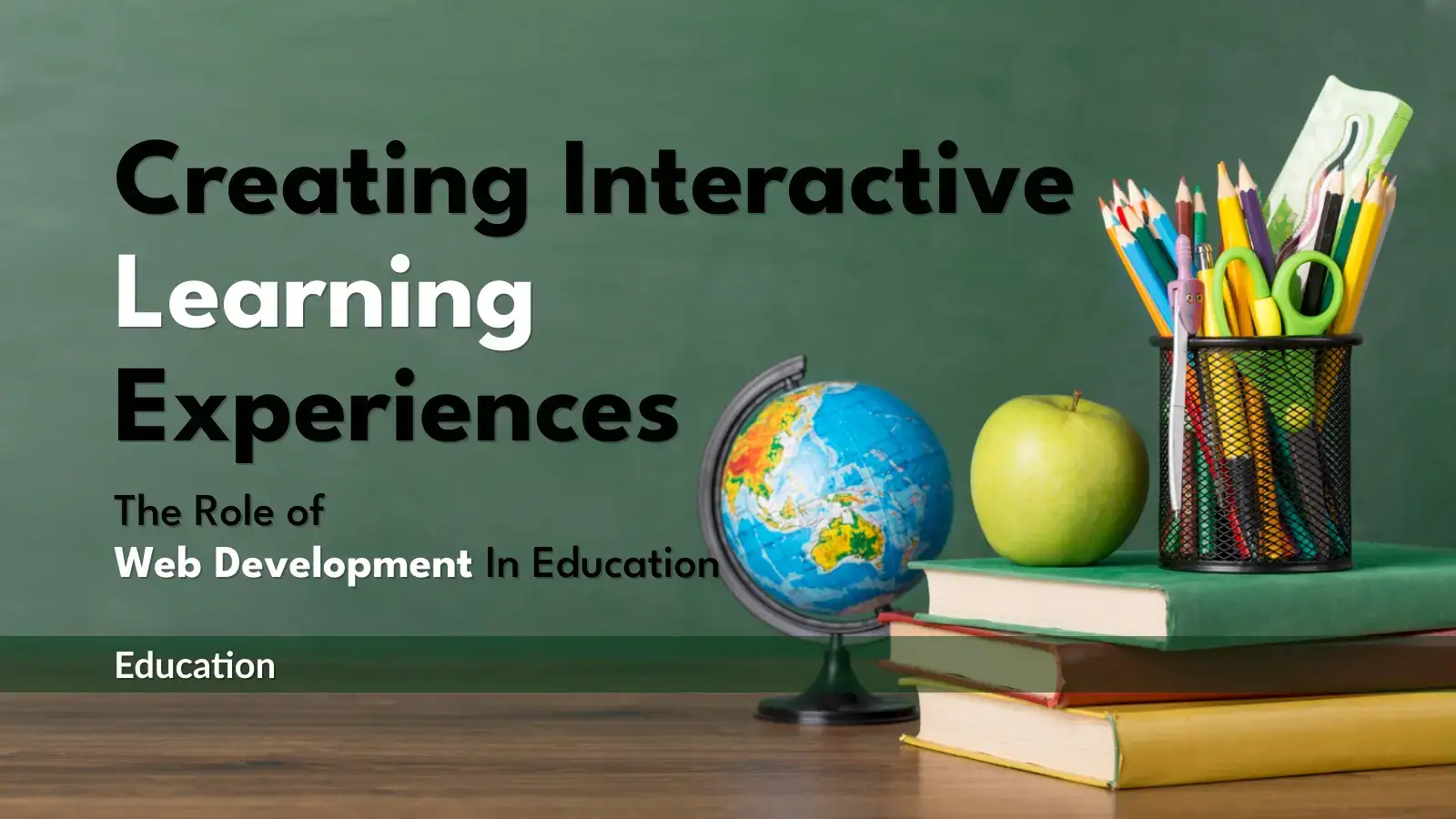Creating Interactive Learning Experiences: The Role of Web Development in Education

Introduction:
In the digital era, traditional educational methods are being augmented and sometimes replaced by innovative web development solutions that offer interactive and engaging learning experiences. Web development plays a pivotal role in shaping the future of education by providing platforms and tools that facilitate collaboration, personalization, and accessibility. In this comprehensive guide, we will explore the significance of web development in education and how it contributes to creating interactive learning experiences that enhance student engagement and foster academic success.
The Importance of Interactive Learning:
Interactive learning goes beyond the passive consumption of information and encourages active participation and engagement from students. By incorporating elements such as multimedia content, quizzes, simulations, and collaborative activities, interactive learning experiences promote critical thinking, problem-solving skills, and a deeper understanding of the subject matter. Web development plays a crucial role in creating and delivering these interactive experiences, providing the technological infrastructure and tools necessary to engage students in meaningful learning activities.
Key Components of Interactive Learning:
- Multimedia Content: Web development enables the creation and delivery of multimedia content, including videos, animations, audio recordings, and interactive presentations. These multimedia elements enhance the learning experience by providing visual and auditory stimuli that cater to different learning styles and preferences.
- Interactive Assessments: Web-based assessments allow educators to gauge students’ understanding of course material through quizzes, tests, and interactive exercises. By providing immediate feedback and opportunities for self-assessment, interactive assessments help students track their progress and identify areas for improvement.
- Collaborative Tools: Web development facilitates collaboration among students and educators through features such as discussion forums, virtual classrooms, and shared document editing. These collaborative tools promote teamwork, communication, and knowledge-sharing, enabling students to learn from each other and engage in collaborative problem-solving activities.
- Personalization: Web development enables the creation of personalized learning experiences tailored to individual students’ needs, interests, and learning styles. Through adaptive learning algorithms and customization options, educators can deliver content and instruction that address each student’s unique strengths and weaknesses, maximizing learning outcomes and academic success.
Benefits of Web Development in Education:
- Accessibility: Web-based educational resources are accessible anytime, anywhere, allowing students to learn at their own pace and convenience. This accessibility eliminates geographical barriers and accommodates diverse learning needs, making education more inclusive and equitable.
- Engagement: Interactive learning experiences captivate students’ attention and foster active participation, leading to higher levels of engagement and motivation. By incorporating gamification elements, real-world scenarios, and interactive simulations, web development enhances the overall learning experience and promotes student success.
- Flexibility: Web development offers flexibility in terms of content delivery, instructional methods, and assessment strategies. Educators can adapt and customize web-based resources to meet the evolving needs of their students, ensuring relevance and effectiveness in diverse learning environments.
- Scalability: Web-based educational platforms can accommodate large numbers of users simultaneously, making them scalable and cost-effective solutions for educational institutions of all sizes. Whether it’s a small classroom or a massive open online course (MOOC), web development provides the infrastructure and scalability needed to support seamless learning experiences for students worldwide.
Challenges and Considerations:
While web development offers numerous benefits for education, it also presents challenges and considerations that educators and developers must address. These include issues such as the digital divide, technological barriers, privacy concerns, and the need for digital literacy skills. Additionally, ensuring the quality and credibility of online educational resources and maintaining data security are critical considerations for maximizing the effectiveness of web-based education initiatives.
Conclusion
In conclusion, web development plays a pivotal role in creating interactive learning experiences that enhance student engagement, foster academic success, and prepare learners for the challenges of the 21st century. By leveraging web-based technologies and tools, educators can create personalized, accessible, and engaging learning environments that cater to diverse student needs and preferences. As we continue to harness the power of web development in education, let us embrace innovation and creativity to build a brighter future for learners around the world.
Frequently asked questions
Web development plays a crucial role in creating interactive learning experiences by enabling the design and implementation of engaging and dynamic educational content, platforms, and applications. It allows for the integration of multimedia elements, interactive features, and personalized learning experiences tailored to the needs and preferences of learners.
Interactive learning enhances the educational experience by promoting active
engagement, critical thinking, and knowledge retention among learners. It allows for hands-on exploration, problem-solving activities, collaborative learning experiences, and immediate feedback, fostering deeper understanding and mastery of concepts.
Future trends and opportunities in web development for education include the adoption of emerging technologies such as artificial intelligence (AI), augmented reality (AR), and virtual reality (VR) to create immersive and personalized learning experiences, the integration of social learning features and peer collaboration tools, the expansion of mobile learning solutions, and the emphasis on accessibility and inclusivity in digital learning environments.





